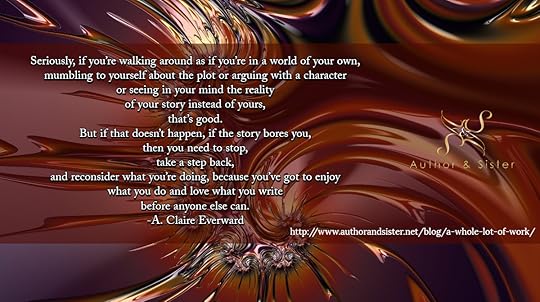A new week, a new month, and a whole lot of work to be done

Twenty-six weeks after the first day of the second new year
Author is now deeply engrossed in her work on her next book for you, and she wants to stay there for a while. This is the heart of the work on her new story, and she can describe it in two ways: she is inching through her draft, adding details, many of which require research as well as making decisions that will affect the character of the story and the direction it takes, and she is tearing apart her draft, making sure the story is clear and consistent. And while these two steps of the work are being done together, once Author feels the story is advanced enough she will do them again, separately this time: she will review the advanced draft to complete any remaining details and will then review it again for consistency and clarity.
Basically, Author has reached the stage where she lives and breathes the story, where it’s what she goes to sleep with at night and what she wakes up with in the morning, where thinking about it is enough to give her the energy she needs to get through the day even after a sleepless night. And that’s where you want to be. Seriously, if you’re walking around as if you’re in a world of your own, mumbling to yourself about the plot or arguing with a character or seeing in your mind the reality of your story instead of yours, that’s good. But if that doesn’t happen, if the story bores you, then you need to stop, take a step back, and reconsider what you’re doing, because you’ve got to enjoy what you do and love what you write before anyone else can.
As Author is progressing in her work, and as she is seeing what the story needs, she is better able to plan her work ahead. Still, she stops to assess her progress every few days, to see if anything is proving more time consuming than she had thought, if there’s anything that needs to be done that she hadn’t thought of in advance and that will require the allocation of additional time, or if anything has gone faster than expected (although that’s a rare one, isn’t it?), and she then looks at the weeks and months ahead to see how her schedule will be affected.
Of course, the risk in being so busy and in your mind being overrun with so many details, alongside the need to do other things—life does continue outside work, after all—means you run the risk of forgetting something. So when there’s something you want to remember to do with your story, something you want to add or change or remove or research, don’t wait, write it down immediately. Perhaps not on a random piece of paper, though. These things tend to accumulate and pretty soon you find yourself with little notes strewn all over the place, and that’s a good way to lose one and miss something that could be important. Just get a notebook or a notepad, something you can also take with you when you go out, and make that the place you write things in. Yes, we do have laptops nowadays, but your laptop might be off or not within your reach just when you need it, or by the time you open the file you keep your reminders in you might forget what you wanted to remember. You’d be surprised how handy the good old notebook and pen can be in such instances. And no, don’t wait, don’t be so sure you’ll remember later. A phone call, suddenly remembering that you need to buy milk, or just your eyes moving to the next paragraph in your story and finding something else that needs to be changed, and there, you forgot what it was you wanted to remember to do.
We’re busy, our minds are overloaded, too often we’re tired, and, hey, we’re human.
A tip for this week before Author goes back to her next story for you? Let’s see. Yes, here’s one you will have heard from Author before and are sure to hear from her again, one that is true every week and every day of the week: get to work.
Published on July 02, 2018 06:04
•
Tags:
if-you-don-t-like-what-you-write, try-again
No comments have been added yet.



